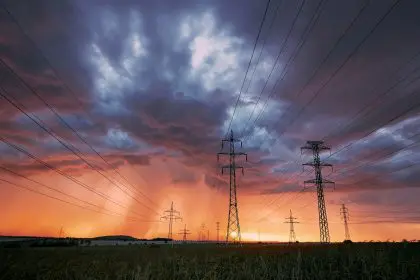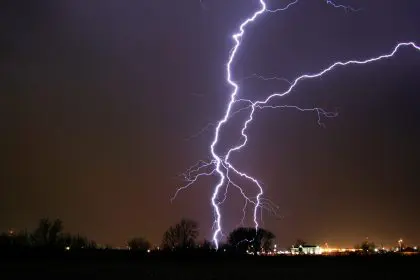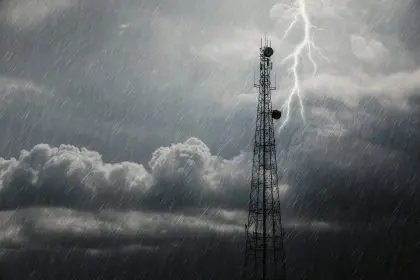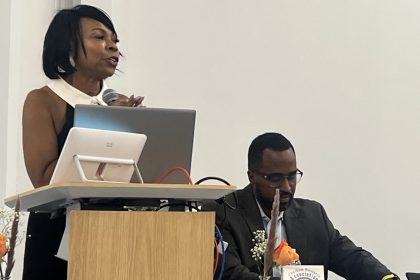A devastating weekend weather event has plunged tens of thousands of Georgia residents into darkness as severe storms battered the northern part of the state, leaving utility companies scrambling to restore power to more than 56,000 customers.
The weather crisis began Saturday when powerful storms swept through metro Atlanta, bringing heavy rain and dangerous winds that toppled trees and damaged power lines throughout the region. Sunday morning brought little relief as a second wave of severe weather struck additional counties west and south of Atlanta, compounding the electrical grid damage.
Georgia Power and Georgia EMC, the state’s primary utility providers, reported widespread outages affecting customers from the Tennessee border down through the metro Atlanta area. The combined impact has created one of the most significant power restoration challenges the region has faced this year.
Utility companies deploy emergency response teams
Georgia Power mobilized its entire weekend crew roster to address the crisis, with more than 30,000 customers affected across their service territory as of Sunday morning. The company’s emergency response teams worked through the night despite dangerous conditions that included ongoing rain, high winds, and lightning strikes.
Company officials emphasized that restoration efforts continue even when crews are not visible in affected neighborhoods. Many repair teams focus on transmission lines and major distribution points that can restore power to large numbers of customers simultaneously before moving to individual service areas.
Georgia EMC reported nearly 26,000 additional outages across their cooperative network, bringing the statewide total to approximately 56,000 affected customers. The cooperative’s service area spans multiple regions, with the heaviest concentration of outages occurring in metro Atlanta and northeast Georgia.
Emergency management officials have been coordinating with both utility companies to ensure repair crews can access damaged areas safely while weather conditions remain unstable throughout the region.
Madison County bears heaviest impact from storm damage
The hardest-hit area appears to be Madison County, where Georgia Power reported 3,313 customers without electricity as of Sunday morning. This mountainous region north of Atlanta often experiences severe weather impacts due to its terrain and dense tree cover near power lines.
- Madison County leads with 3,313 outages, representing roughly 11% of the total Georgia Power customers affected
- Habersham County follows closely with 3,094 customers in the dark
- Hall County, home to Gainesville, reported 2,279 outages impacting residents and businesses
- DeKalb County, part of metro Atlanta, experienced 1,920 outages affecting suburban communities
- Stephens County recorded 1,765 customers without power in the northeastern region
- Cobb County, a major Atlanta suburb, saw 1,755 outages disrupting weekend activities
- Fulton County, which includes Atlanta, reported 1,502 customers affected by the storms
- Lumpkin County experienced 1,452 outages in the north Georgia mountains
- Bartow County northwest of Atlanta had 1,389 customers losing electricity
- Banks County rounded out the top ten with 1,246 outages in the northeastern region
Floyd County also experienced significant impacts with 1,027 customers affected, demonstrating how the storm system’s reach extended well beyond the immediate Atlanta metropolitan area.
Regional cooperatives face widespread distribution challenges
Georgia EMC’s outage tracking system shows the crisis extends far beyond individual counties, with regional impacts creating complex restoration challenges. The cooperative structure means multiple smaller utility companies must coordinate their response efforts while sharing resources and expertise.
Metro Atlanta bore the brunt of the cooperative outages with 11,690 customers affected across multiple counties. This figure represents the largest single regional impact within the EMC system and includes both suburban and urban areas where tree damage to power lines created cascading failures.
Northeast Georgia reported 5,620 outages concentrated in mountainous counties where terrain makes restoration efforts more difficult and time-consuming. Crews in this region must often use specialized equipment and techniques to reach damaged infrastructure in remote locations.
North Georgia recorded 7,306 customers without power, an area that includes popular mountain resort communities and rural residential areas. The combination of weekend tourism and permanent residents creates additional pressure on utility companies to restore service quickly.
West Georgia experienced the lightest impact with 652 reported outages, suggesting the storm system’s primary force focused on the northern and eastern portions of the state.
Weather conditions complicate restoration timeline
The ongoing threat of severe weather has forced utility companies to balance speed with safety in their restoration efforts. Crews cannot work on power lines during active lightning storms, and high winds make it dangerous to operate bucket trucks and other specialized equipment needed for repairs.
Sunday morning’s second round of storms created additional challenges as crews working to repair Saturday’s damage faced new outages and infrastructure problems. This layered impact means some areas may experience extended outages as utility companies prioritize the most critical repairs first.
Weather forecasters continue monitoring conditions throughout north Georgia, with the potential for additional storm activity that could further complicate restoration efforts. Utility companies have advised customers to prepare for potentially extended outages in some areas.
Community impact extends beyond residential customers
The widespread outages have affected more than just residential customers, with businesses, schools, and community services also impacted by the power failures. Weekend activities and events across north Georgia faced cancellations or modifications due to the electrical grid problems.
Grocery stores and pharmacies in affected areas have been operating on backup power where available, though some locations had to close temporarily. Gas stations without generator backup became inaccessible, creating additional challenges for residents trying to fuel vehicles or generators.
Emergency services continue operating normally thanks to backup power systems, but officials encourage residents to avoid unnecessary travel in areas where traffic signals may not be functioning properly.
Restoration efforts expected to continue through Monday
Utility officials have not provided specific timeline estimates for complete power restoration, citing the extent of damage and ongoing weather concerns. However, both Georgia Power and Georgia EMC have committed to continuous operations until all customers have their electricity restored.
The companies are utilizing mutual aid agreements with utilities from neighboring states to bring in additional crews and equipment as weather conditions permit. This coordinated response approach helps accelerate restoration efforts during major weather events.
Residents are encouraged to report outages through official utility websites and mobile applications rather than calling, as phone systems become overwhelmed during widespread events. Both companies provide real-time outage maps and estimated restoration times when available.
Officials remind customers to stay away from downed power lines and to use generators only in well-ventilated outdoor areas to prevent carbon monoxide poisoning. As restoration work continues, the safety of both utility crews and the public remains the top priority throughout the recovery process.

















